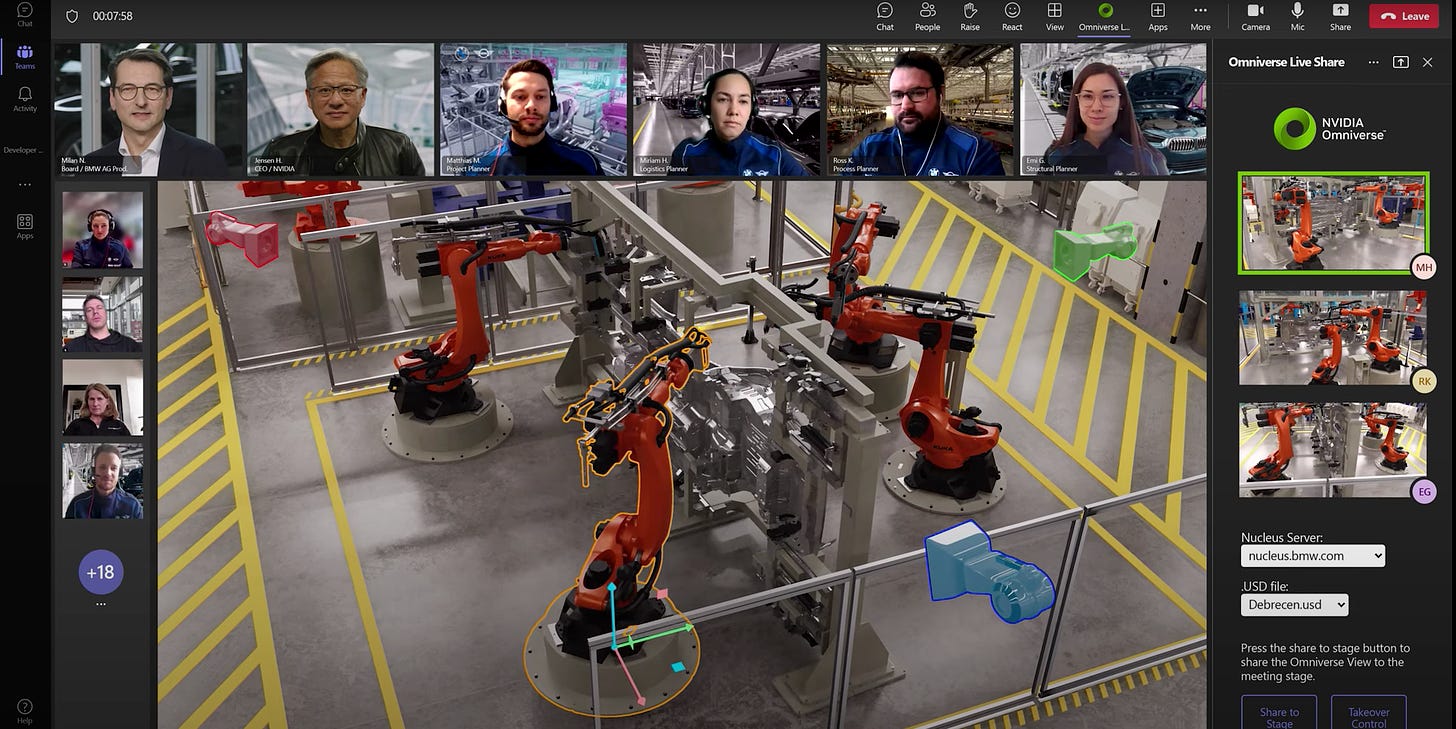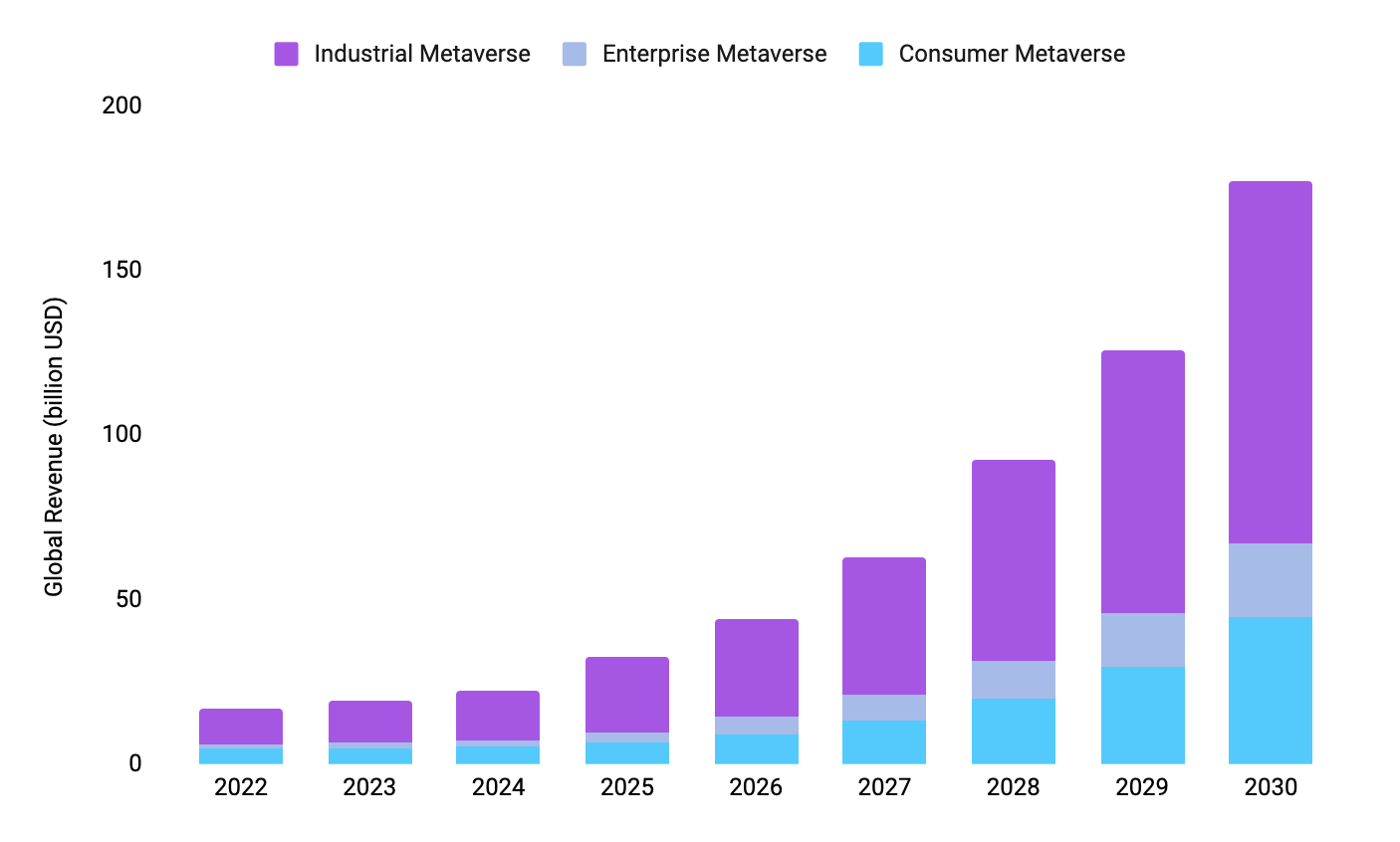It might be no surprise that replicating something digitally is easier (and cheaper!) than building a physical copy. Inspired by this premise, companies looking to design, build, and test products and processes are going digital-first.
Enter the “Industrial Metaverse.” In this sector of the metaverse, companies recreate physical objects (“digital twins”), envisage models, share ideas remotely, and simulate environments: factories, construction sites, transport systems, and entire cities.
The “Consumer Metaverse” instead refers to consumer-facing products and experiences, e.g., in gaming or mobile apps; the “Enterprise Metaverse” captures new ways of working and virtual workspaces such as Accenture’s Nth Floor.
Building digital replicas is nothing new. What’s novel in the Industrial Metaverse is their realism, scale, and accuracy, owing to advances in computing, AI, and connectivity. Autonomous robots meanwhile rely on digital twins to navigate.

The Industrial Metaverse is emerging as a dark horse. According to ABI Research, global revenue from this sector is set to reach $100 billion by 2030 (Allied Market Research put this at $126 billion; Gartner estimates $183 billion by 2031.)
Besides the bottom line, the Industrial Metavserse can advantage workers—digital tools are less dangerous than physical ones—and the environment, by substituting physical manufacturing and optimising processes to be more energy-efficient.
But—policy considerations:
The future of work. How long should industry workers be expected to work in virtual spaces, with currently-uncomfortable headgear? How will employers responsibly manage new means to surveil and monitor their workforce?
Connectivity. Building an Industrial Metaverse without proper connectivity is like designing a carriage without a horse. Industrial devices—sensors, cameras, robots, etc.—will require a reliable connection to communicate effectively.
“5G is paramount because 5G is ultra-fast and it's ultra-reliable… If you have an AGV - an autonomous guided vehicle, you don’t want to lose contact and the AGV crashes into the other car, right?” — Peter Koerte, Siemens CTO.
Interoperability. Most digital twins are currently custom-made. But all the cogs—data formats, protocols, APIs—need to fit together to enable collaboration between partners and suppliers. Ideally, through open technical standards.
For example, Nvidia’s Omniverse Structure is based on open standards and aims for “university interoperability across different applications and vendors.”

Into the EU metaverse…
Policy
European Commission
The Commission’s public consultation on virtual worlds closed. It received 169 responses, including from the XR Association, Creative Commons, Vodafone, Meta, LEGO, Snap, Epic Games, XRSI, and Wikimedia.
The Commission’s long-awaited communication on virtual worlds is delayed (again***) to 11 July.
European Parliament
Internal Market and Consumer Protection Committee (IMCO)
CULT published its thoughts on IMCO’s virtual worlds file, calling for dedicated EU funding and a framework for IP protection. It also suggested NFTs “can represent a new source of revenue for the EU’s cultural ecosystem.”
Renew’s Vlad-Marius Botoş 🇷🇴 joins the list of shadow rapporteurs.
Legal Affairs Committee (JURI)
JURI’s virtual worlds file went live: “Policy implications of the development of virtual worlds – civil, company, commercial and intellectual property law issues.”
Rumour mill. EPP’s Axel Voss 🇩🇪 and S&D’s Ibán García del Blanco 🇪🇸 were set to work on the IMCO report and could now lead this one.
The Council
A recent proposal for the Council recommends that Member States pursuing digital education strategies should support the development of “emerging technologies including eXtended Reality, virtual reality, augmented reality, artificial intelligence, robotics, and [sic] metaverse.”
Elsewhere
🇫🇮 Business Finland launched the Finnish National Metaverse Strategy.
🇫🇮 Finland’s Ministry of Transport and Communications answered the EU’s consultation, urging the EU to ensure its technological maturity, protect individuals’ assets (including tokenized assets), and facilitate innovation and development.
Business
🇪🇺 The EU approved Microsoft’s acquisition of Activision Blizzard, arguing it potentiated “a significant improvement for cloud gaming.”
🇪🇺 According to research by Meta, successful development of the metaverse could add €259-€489 billion per year to the bloc’s GDP by 2035.
🇫🇷 Balenciago, a luxury brand, launched an augmented reality game to raise awareness around sustainable farming.
🇦🇹 Vrisch, an eXtended Reality experience company, showcased immersive installations around EGLO World of Lights, Europe’s biggest lighting house.
🇩🇪 Oldenburg Film Festival—“Germany’s Sundance”—will allow fans to enter a virtual reality version of the event.
🇫🇷 Orange collaborated with Snapchat to launch an immersive storying experience of Notre Dame, allowing users to engage with the site through a digital guide.
Events
Brussels folk! Metaverse Meetup v.2, a casual networking gig, will take place at Lïlot Corse on 24 May from 6.30 pm. Sign up here for an invite.
Panels
24 May Reverse on the metaverse, or enter a brave new world? (Brussels 🇧🇪)
24 May How do we create safe, child-friendly interactive platforms? (online)
14 June Web3 & Digital Identity (online)
Conferences
7 Jun – 8 Jun Non-Fungible Conference (Lisbon 🇵🇹)
8 Jun - 9 Jun XR4Europe Summer Event (Helsinki 🇫🇮)
12 Jun – 13 June Metaverse Summit (Paris 🇫🇷)
28 Jun – 30 Jun BlockChance (Hamburg 🇩🇪)


